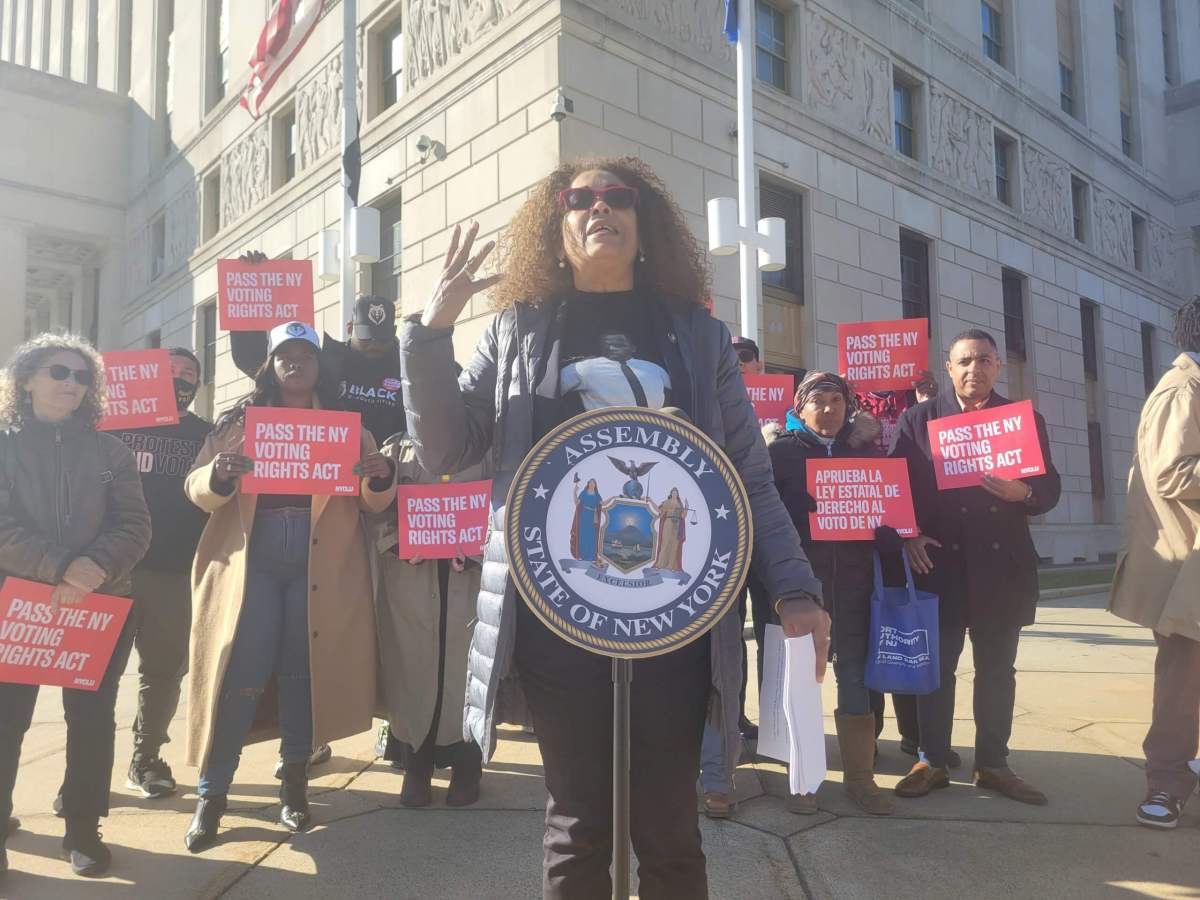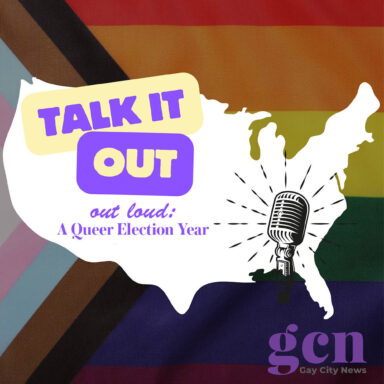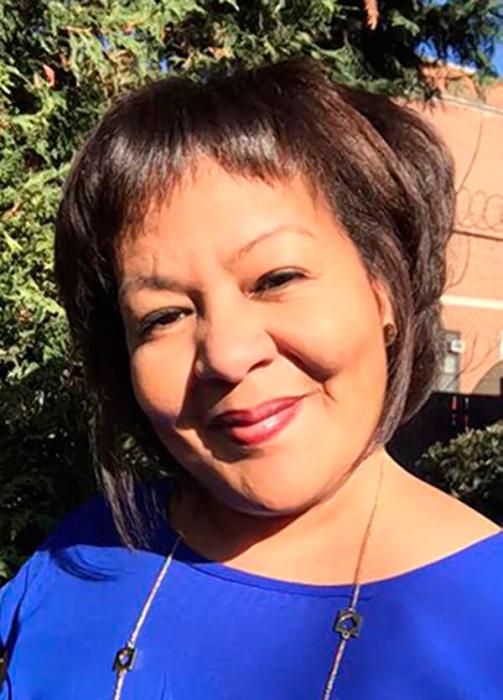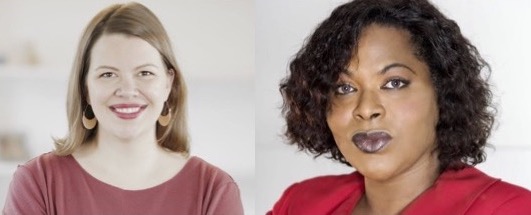Despite progress, millions of New Yorkers believe voter suppression, voter intimidation, language assistance failures, inconvenient polling locations and discrimination in federal, state and local elections still present major issues.
With the state Legislature set to go on summer recess in June, Assemblymembers Yudelkia Tapia, a University Heights Democrat, and Amanda Septimo, a Concourse Democrat, were joined by the New York Civil Liberties Union (NYCLU) and other civil rights leaders at Bronx Borough Hall to rally for the passage of the John R. Lewis Voting Rights Act of New York on April 28. The bill would ensure that everyone has an equal opportunity to participate in the political process and can cast a meaningful ballot — without obstruction. The John Lewis Voting Rights Act failed to pass on the federal level last year, but the state version of the bill, if enacted, would be the strongest and most comprehensive state voting rights act to date.
In 2020, former state Assemblymember Michael Blake who lost a congressional primary to Ritchie Torres, addressed allegations of voter suppression in his Bronx district. There had been a polling site in Concourse Village East, at 158th Street, for 25 years that had accounted for the highest number of Black voters in the district. But, according to Blake, the site was suddenly changed.
During that same election, voting was delayed by an hour at M.S. 29, located at 758 Courtlandt Ave. At M.S .301, at 890 Cauldwell Ave., the line wrapped around the school and some people didn’t vote because there were an insufficient number of poll workers.
We know that voting rights are under attack across the country, so I am grateful to @NYCLU & my colleague @YudelkaTapia for organizing a Bronx rally in support of passing the John Lewis Voting Rights Act of NY! It’s time for New York to lead on this critical issue! pic.twitter.com/AcA7aDOAum
— Amanda Septimo (@AmandaSeptimo) April 29, 2022
The federal John Lewis Voting Rights Advancement Act of 2021 was proposed legislation to restore and strengthen parts of the Voting Rights Act of 1965. Particularly, it would have restored the Voting Rights Act’s requirement that certain states preclear certain changes to their voting laws with the federal government. The legislation was named after John Lewis, the late Georgia representative and voting rights activist. Preclearance is defined as the process of seeking U.S. Department of Justice approval for all changes related to voting.
The proposed state legislation would address voting rights discrimination through a comprehensive framework that includes:
- Legal tools to fight racial voter suppression and vote dilution that are stronger and clearer than federal law or other state laws.
- A preclearance program bringing the most effective civil rights law in U.S. history back to New York by putting the burden on authorities to avoid discrimination rather than on voters to find and fight discrimination.
- Expanded language assistance to limited English proficient voters.
- Protections against voter intimidation, deception and obstruction.
- An instruction to courts to interpret the Election Law to ensure that qualified voters can cast ballots and have them counted whenever possible.
- The creation of a central public repository for election and demographic data to promote transparency and evidence-based best practices for election.
“We’re here today because we want to talk about the voting rights in New York state,” Tapia said at the rally. “Representation matters to people who can’t speak English.”
Tapia pointed out how in 2020 there were incomplete or incorrect ballots, understaffed polling sites, broken scanning machines, absentee ballots that didn’t arrive in the mail and many other voting issues in NYC. Additionally, in 2016, 200,000 Brooklyn voters found their names deleted from voter rolls.
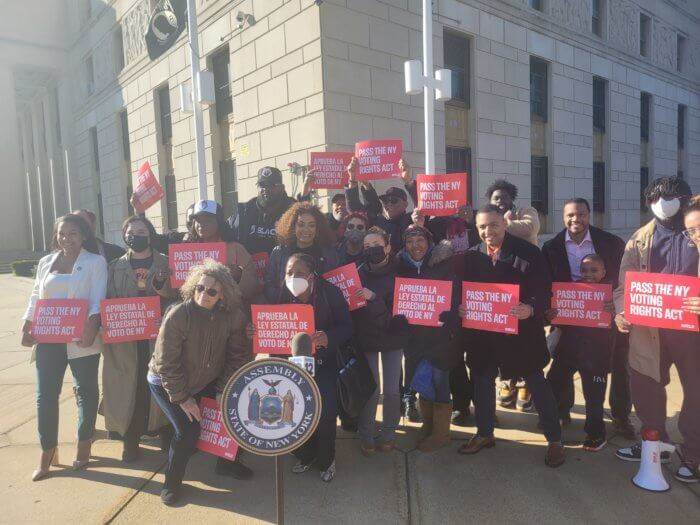
According to Tapia, there’s a large segment of the Bronx population that doesn’t speak English, so when there is no one at the polling sites to translate, they can get frustrated and leave.
“Many people are sent to a different polling site and then to another polling site,” she said. “To be able to fix that we have to pass the John Lewis Voting Rights Act for New York state.”
Perry Grossman, a voting attorney with the NYCLU, echoed Tapia’s sentiments that people must have equal rights when voting. There needs to be pre-clearance for voting, equal access for people of color and most importantly, New York must be a leader on this issue so that other states and hopefully the federal government follows suit, he said.
“It (the bill) gives us the tools we need to make better policy,” Grossman said. “The right to vote is fundamentally the right to demand better.”
Chivona Newsome, co-founder the New York chapter of Black Lives Matter, said nearly 60 years ago Dr. Martin Luther King Jr., John Lewis and other activists fought for voting rights and yet still people face obstacles when voting.
“People know the true power of the vote, that’s why they try to strip it away,” said Newsome, who ran unsuccessfully for the 15th Congressional District in 2020. “The Bronx, which has one of the nation’s poorest congressional districts, where people suffer the worst in terms of housing, in terms of education, that’s why they’re trying to deny us here our voting rights. This is why the John Lewis Voting Rights Act of New York is so important.”
Reach Jason Cohen at jcohen@schnepsmedia.com or (718) 260-4598. For more coverage, follow us on Twitter, Facebook and Instagram @bronxtimes

